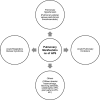Pulmonary hypertension associated with antiphospholipid antibody: Call for a screening tool?
- PMID: 28944137
- PMCID: PMC5608925
- DOI: 10.5582/irdr.2017.01044
Pulmonary hypertension associated with antiphospholipid antibody: Call for a screening tool?
Abstract
Antiphospholipid (aPL) antibodies are antibodies specific for anionic phospholipids. They are immunoglobulins that attack phospholipids, phospholipid-binding proteins, or phospholipid-protein complexes and are detected in anticardiolipin and lupus anticoagulant assays. aPL antibodies are often associated with antiphospholipid syndrome (APS) which can be idiopathic or from secondary causes such as systemic lupus erythematosus (SLE), infection or drugs. They have also been shown to be associated with Pulmonary Hypertension. We conducted a review of the literature that included all articles on PubMed with keywords 'antiphospholipid antibody' and 'pulmonary hypertension' between January 1980 and July 2017 and identified 217 articles. A total of 47 articles were found to be relevant to the topic and included as references. We ascertained that aPL antibodies have been implicated in the development of both idiopathic pulmonary arterial hypertension (PAH) and PAH associated with connective tissue disease (CTD). aPL antibodies were also noted to be associated with left-sided valvular heart disease that can lead to pulmonary venous hypertension (PVH). Patients with anitiphospholipid antibody syndrome (Diagnostic criteria incudes +aPL antibodies) were noted to have a high risk of developing chronic thromboembolic pulmonary hypertension (CTEPH). A recent study also found a positive association of aPL antibodies with ILD and PH in patients with systemic sclerosis. While association between autoimmune thyroid disease and PH (Group V PH), and autoimmune thyroid disease and aPL antibodies is established, no studies linked these three phenomena together. Thus, aPL antibodies had an association with all WHO groups of Pulmonary hypertension (PH). In this review article, we study the association and discuss the need for screening for PH in patients with positive aPL antibodies.
Keywords: Pulmonary hypertension; antiphospholipid antibodies; antiphospholipid antibody syndrome; chronic thromboembolic pulmonary hypertension; systemic lupus erythematosus.
Figures
References
-
- Misita CP, Moll S. Antiphospholipid antibodies. Circulation. 2005; 112:e39-e44. - PubMed
-
- Asherson RA, Cervera R, Merrill JT, Erkan D. Antiphospholipid antibodies and the antiphospholipid syndrome: Clinical significance and treatment. Semin Thromb Hemost. 2008; 34:256-266. - PubMed
-
- Miyakis S, Lockshin MD, Atsumi T, Branch DW, Brey RL, Cervera R, Derksen RH, DE Groot PG, Koike T, Meroni PL, Reber G, Shoenfeld Y, Tincani A, Vlachoyiannopoulos PG, Krilis SA. International consensus statement on an update of the classification criteria for definite antiphospholipid syndrome (APS). J Thromb Haemost. 2006; 4:295-306. - PubMed
-
- Ford HJ, Roubey RA. Pulmonary manifestations of the antiphospholipid antibody syndrome. Clin Chest Med. 2010; 31:537-545. - PubMed
-
- Stojanovich L. Pulmonary manifestations in antiphospholipid syndrome. Autoimmun Rev. 2006; 5:344-348. - PubMed
Publication types
LinkOut - more resources
Full Text Sources
Other Literature Sources
Miscellaneous



